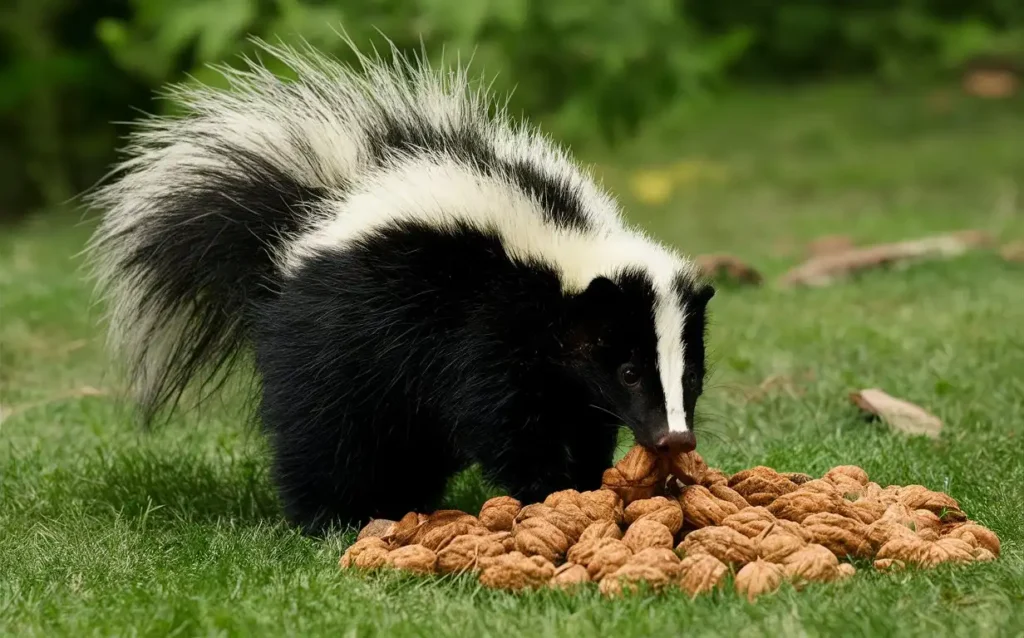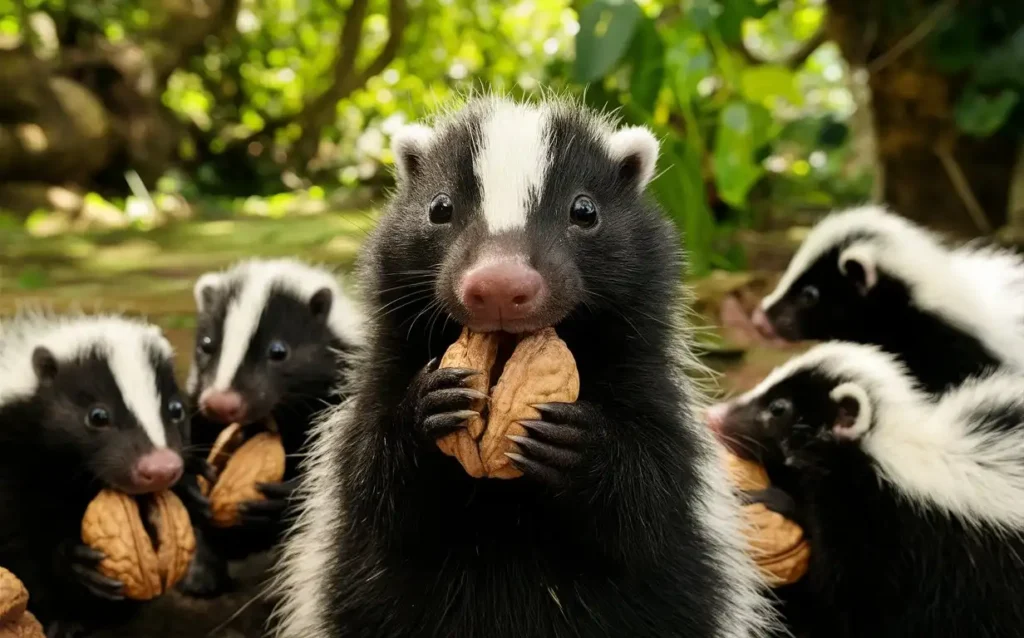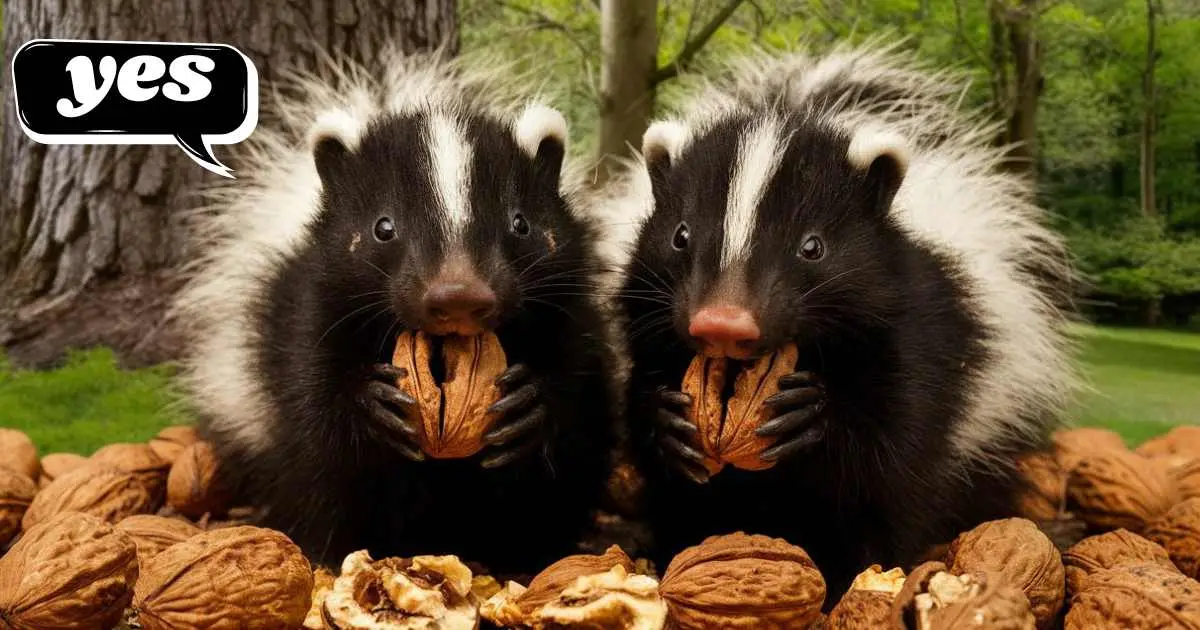Do Skunks Eat Walnuts?
Last updated on September 30th, 2024 at 09:00 am
In my journey as a skunk pet owner and wildlife enthusiast, I’ve seen firsthand how diverse skunks’ diets are. Did you know that skunks eat walnuts? These curious creatures munch on everything from bugs to nuts, playing a crucial role in nature. Read on to learn more about how skunks help balance their habitat by eating a variety of foods, including walnuts!
Skunks In A Nutshell
Skunks, often recognized by their black-and-white coloring and the pungent odor they produce, are quite the connoisseurs in the wild. They have diverse tastes and are often misunderstood as creatures that only create a stink. Let’s crack open their world and see if walnuts fit into their dining habits.
The Skunk’s Diet: An Introduction
Skunks are omnivores, which means they eat both plants and animals. Their diet is quite varied depending on what they can find in their habitat. Here’s a breakdown:
- Insects and grubs – A favorite snack that provides protein.
- Fruits and berries – Sugary treats that give them energy.
- Small rodents – Occasionally, they hunt for added sustenance.
- Garbage and pet food – Skunks aren’t shy about scavenging.
But do they eat walnuts? Yes, these nuts can be part of their diet as well. Skunks will eat walnuts if they come across them on the ground.
Skunk Species And Their Habitats
Different skunk species inhabit various regions across the globe. Here are a few you might find:
| Species | Habitat |
|---|---|
| Striped Skunk | North America |
| Spotted Skunk | Woodlands and open areas |
| Hog-nosed Skunk | Deserts, brush, forests |
Each species has adapted to their environment, and that includes their diet. While not all may crack open a walnut, it’s not out of the question for these adaptable critters.
Uncovering Skunk Foraging Behavior
As they shuffle through the underbrush, skunks showcase a fascinating aspect of their existence: their diet. It’s common to wonder what these nocturnal creatures munch on during their nighttime escapades. For example, do skunks eat walnuts? Understanding what skunks forage for tells us much about their ecological role.
Nightly Quests For Food
When night falls, skunks embark on their search for food. They’re not picky eaters; their diet includes a variety of foods. Skunks will consume fruits, insects, and small rodents alike. While they have a diverse menu, one question arises: do they fancy walnuts?
- Skunks use their strong forefeet to dig for grubs and worms.
- They are attracted to gardens with ripe fruits and vegetables.
- Fallen walnuts, when available, are a potential food source.
Their excellent sense of smell guides them to food, including any walnuts on the ground. They crack these hard shells with their powerful teeth. Walnuts, though, make up only a small part of their diet.
Torpor: How Diet Changes With Seasons
As winter approaches, skunks’ eating habits transform with the changing temperatures. Skunks enter a state called torpor, a period of decreased activity. This impacts their need for food.
| Season | Dietary Needs | Food Availability |
|---|---|---|
| Winter | Reduced due to torpor | Scarce |
| Spring/Summer | Higher to support activity | Abundant |
In winter, they rely on their fat reserves and are less likely to forage for walnuts. They seek warmer refuges such as hollow logs or under decks. Therefore, skunks’ walnut consumption is very season-dependent.
- During torpor, skunks might not forage for weeks at a time.
- They prioritize high-fat foods before winter to build reserves.
- Walnut consumption is more common in autumn when nuts are plentiful.
In summary, while skunks can eat walnuts, this behavior is influenced by the season and their habitat. As opportunistic foragers, skunks adapt their diet to what the environment offers, focusing on survival and energy conservation.
Nutty Affairs: Skunks And Walnuts
Curiosity often sparks when discussing the eating habits of skunks, especially concerning their taste for nuts. Skunks are not picky eaters. Still, walnuts hold a special place in their diverse diet. Exploring the relationship between skunks and walnuts unveils a fascinating aspect of their nocturnal lives. Let’s crack open this topic and see why skunks might go nuts for walnuts.
The Appeal Of Walnuts To Skunks
What makes walnuts an attractive snack for our skunk friends? Rich in nutrients and calories, walnuts offer skunks much-needed energy. Their powerful sense of smell leads them to these tasty treats. Despite their hard shells, skunks have strong teeth that can breach this barrier.
- High caloric content provides energy.
- Rich in protein and fats, it is beneficial for a skunk’s health.
- Ample availability in areas with walnut trees attracts foraging skunks.
Observing Skunk-walnut Interactions In The Wild
Observing these nocturnal creatures in action is both challenging and rewarding. Skunks do not shy away from walnuts found during their nightly forays. Careful observers can sometimes witness the skunks’ determined efforts to crack open and consume these nutty delights.
| Time of Activity | Skunk Behavior | Walnut Accessibility |
|---|---|---|
| Nighttime | Foraging for food | Available on the ground |
| Early Morning | Finishing nightly rounds | Same as nighttime |
Trail cameras may capture these interactions, providing a glimpse into the skunks’ feeding patterns. With patience, one might even spot shell remnants near skunk dens as evidence of their nutty feasts.
Walnuts On The Menu
Picture a black and white creature of the night, nose to the ground, foraging for food. Skunks have diverse tastes, and this includes nuts like walnuts. These hard-shelled treats may not be the first choice for many animals, but skunks do not shy away from them. Walnuts offer a nutritious snack to omnivorous skunks, complementing their diet of insects, plants, and small animals.

Techniques Skunks Use To Access Walnut Treats
Skunks employ several methods to get to the delicious meats of walnuts:
- Crushing with their strong teeth
- Digging to uncover hidden walnuts
- Using paws to break open shells
Although their paws lack the dexterity of some animals, skunks are persistent. They will roll and push the nuts against hard surfaces to crack the tough outer shell.
Potential Health Benefits For Skunks Consuming Nuts
This natural food source can be quite beneficial for skunks. The nutritional profile of walnuts includes:
| Nutrient | Helps in muscle-building |
|---|---|
| Proteins | Helps in muscle building |
| Fats | Provides energy |
| Vitamins | Boosts overall health |
| Minerals | Promotes bone strength |
Antioxidants in walnuts can also help skunks fight off diseases. A blend of healthy fats, proteins, and fibers aids in their well-being. Adding nuts such as walnuts to their diet supports balanced nutrition.
Human-skunk Conflict: Walnuts As Bait
Skunks are curious creatures often drawn to our backyards. Walnuts can create a battle between humans and skunks. People love walnut trees. Skunks love the nuts. Sometimes, walnuts become an unexpected bait, luring skunks closer to our homes. Understand this dynamic, and prevent furry visitors from becoming permanent guests.
Backyard Encounters: Skunks And Walnut Trees
People plant walnut trees for shade and nuts. Skunks search for walnuts to eat. This can lead to surprise meetings in our yards. Skunks don’t mean to bother us. They just want to eat the tasty nuts that fall from the trees. Their search for food can lead them right to our doorsteps.
Mitigating Skunk Intrusions: Do Walnuts Attract Them?
Do walnuts really bring skunks to our yards? It’s a common question. The answer is yes. Skunks love eating walnuts, and they have a great sense of smell. Walnuts on the ground can be like a dinner bell for skunks. Here are tips to keep skunks away:
- Pick up fallen walnuts often so they don’t attract skunks.
- Use fencing to keep skunks from the walnut trees.
- Try motion-activated sprinklers to scare skunks away.
Keep skunks at a distance just by managing how walnuts are handled in the yard. A few simple actions can reduce the chances of a skunk visit.
Nut Availability And Skunk Populations
Skunks are known for their distinctive spray, but their diet is a lesser-known aspect of their survival in the wild. The availability of nuts, particularly walnuts, impacts skunk populations. This section explores how environmental changes influence their food sources and what that means for these creatures.

Impact Of Deforestation On Skunk Food Sources
Forests provide essential habitats and food for wildlife, including skunks. When trees disappear, so do walnuts—a critical food source for skunks. This loss forces skunks to adapt quickly or face starvation. Deforestation not only endangers these creatures but disrupts the entire ecosystem.
- Reduction in walnut trees: Fewer trees mean fewer nuts.
- Altered food chains: Skunks may turn to other food sources.
- Increased competition: Skunks vie with other animals for remaining food.
Walnut Scarcity And Skunk Survival Strategies
Skunks rely on a varied diet to survive. When walnuts become scarce, they must employ different strategies to find food. These strategies reveal the resilience of skunks but also highlight their vulnerability. Understanding these behaviors can aid conservation efforts.
| Strategy | Description |
|---|---|
| Foraging Shift | Skunks search for alternative food items. |
| Increased Range | They travel further distances to find food. |
| Dietary Adaptation | They adjust their diet based on available resources. |
Diversifying their diets helps skunks cope with changing environments. In these times of limited resources, awareness and action are crucial to ensure their survival.
Future Research And Considerations
As we delve into the nutritional habits of skunks, understanding their diet becomes crucial for conservation efforts. Skunks are known for their adaptive eating patterns, but do they include walnuts? Future studies and contemplations in this area can offer fascinating insights into the dietary proclivities of these creatures.
Studying Diet Flexibility In Skunks
Research on skunk diet flexibility is limited. Scientists aim to fill this gap. Walnuts are high in nutrients. Do skunks eat them often? Study results will guide skunk dietary management strategies.
- Food availability: How it influences skunk foraging habits
- Eating behaviors: Analyzing skunk responses to different foods
- Nutritional needs: Assessing how walnuts meet these needs
Climate Change: Predicting The Impact On Skunk Foraging
Climate change affects wildlife feeding patterns. Its impact on skunk foraging is still unknown. Skunks may rely more on nuts like walnuts due to changing temperatures. Future scenarios must be modeled.
| Climate Factor | Impact on Skunks | Walnut Availability |
|---|---|---|
| Temperature Rise | Shifts in habitat | Variations in walnut growth cycles |
| Increased CO2 Levels | Changes in prey availability | Potential increase in nut yield |
| Altered Precipitation | Altered food sources | Affects walnut tree health |
Understanding these dynamic elements becomes crucial for predicting their impact on the likelihood of skunks eating walnuts. The research community is poised to address these questions, paving the way for robust wildlife management practices.
Frequently Asked Questions
What Food Is Toxic To Skunks?
Chocolate, caffeine, alcohol, and onions are harmful to skunks. Avoid offering these foods to ensure their safety and health.
What Attracts Skunks To Your Yard?
Skunks are drawn to yards by accessible food sources, such as garbage cans, pet food, and gardens. Shelter opportunities, like woodpiles and decks, also attract them. Minimize food access and shelter to deter skunks.
What Should I Not Feed My Pet Skunk?
Avoid feeding your pet skunk chocolate, caffeine, fried and spicy foods, as well as dairy products and refined sugars. Keep onions, garlic, and grapes off their menu to ensure their health.
Do Skunks Like Berries?
Yes, skunks are fond of berries and often include them in their diet. They enjoy a variety of berries, which provide a natural food source.
Conclusion
To wrap up, it’s clear skunks have diverse diets that can include walnuts. These omnivorous creatures often forage for what’s readily available. Remember, though, their walnut-eating habits are incidental, not staple. As you navigate coexistence with backyard wildlife, respecting their dietary choices is key.

